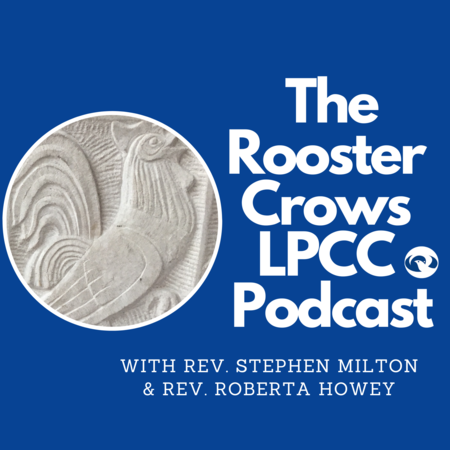
“Who are You?: Abraham and the Three Strangers
Rev. Stephen Milton
Lawrence Park Community Church
July 20 2025
Genesis 18:1-15
Today’s scripture reading is the famous story of Abraham’s meeting with the three
angels. Three men appear suddenly in Abraham’s camp when he is 99 years old. His
wife Sarah is 90. They have been promised a child, but it seems way too late now. So,
on this hot afternoon, Abraham greets these three strangers and invites them to stay for
a meal.
Many artists have painted this scene. In our time, the most famous image is this one by
Marc Chagall.
The three men are clearly portrayed as angels. They sit with their backs to us as Sarah
and Abraham serve them. But, the painting erases a key ambiguity in the story. It shows
the angels with wings.
Yet, in this story, like all Bible stories about angels on Earth, there is no mention of
wings. Instead, Abraham assumes at first that these three strangers are ordinary men,
travellers who are just passing through. He offers them hospitality, a key virtue in the
Bible. He assumes that they eat, and that after a dinner in his presence, they will keep
on going. He doesn’t appear to know or suspect that they are angels.
Abraham goes out of his way to be a great host. Abraham tells his wife Sarah to get
busy, measure out three “seahs” of flour, and get baking. He also tells one of his
servants to go kill a calf and get cooking. Now, the bakers in the crowd will know that if
you want to make a couple of loafs of risen bread, that takes about five cups of flour (
600g). Sarah has been asked to measure out 16 kilograms of flour, which is enough for
53 loaves of bread. If she was making flat breads, that would be even more. So, we’re
talking way more than is needed for these three strangers. So, there is a sense of
radical abundance. Also, Sarah is asked to make the bread herself, with no help from
her servants. Abraham is also acting as a servant, bringing food to the table. 1 He wants
to make sure these three strangers are treated with great care and respect.
Now, it takes time to make bread, and it takes time to kill a calf, butcher it and cook it.
Abraham has time to get to know these men, probably many hours. So, perhaps their
true identity becomes clearer over the intervening hours as the meal is prepared.
But the story begs a question: how do you know when you are in the presence of the
divine? How do you know if God is within the person across the table from you?
This story casts a long shadow for Christians. In the New Testament, the author of the
letter of the Hebrews makes a reference to the story. He says:
Keep on loving one another as brothers and sisters. Do not forget to show
hospitality to strangers, for by so doing some people have shown hospitality to
angels without knowing it. ( Hebrews 13:1-2)
Jesus takes this story much further. A little while before Jesus is arrested, Jesus
describes the day of judgement that will occur at the end of time. He says that the
people who took care of the naked, the sick and the prisoner. They will be rewarded.
Those people, Jesus explains, were me. I was in them, he says. But this is confusing to
his followers who have helped those in need. They will say:
37 ….’Lord, when did we see you hungry and feed you, or thirsty and give you
something to drink? 38 When did we see you a stranger and invite you in, or
needing clothes and clothe you? 39 When did we see you sick or in prison and go
to visit you?’
40 “The King will reply, ‘Truly I tell you, whatever you did for one of the least of
these brothers and sisters of mine, you did for me.’ ( Matthew 25).
1 Jerome, Letter 66 to Pamnachius
Christ has taken the idea of helping strangers to a whole new level. Anyone who needs
help is really Jesus in disguise. I remember hearing this early on in my Christian journey
and being perplexed. Does this mean that we should treat all vulnerable people well
because there was a chance one of them might be Jesus? So, if you took care of 100
people through acts of compassion and charity, one of them might be Jesus? How
would you know? It is a strange and perplexing idea.
Mother Teresa worked in the poorest areas of Calcutta, India. She was a Catholic nun
who ran charities for street children and people in deep poverty.
She referred to the poor as “Christ in his distressing disguise.“ 2
In fact, when asked how she could believe so clearly that Jesus was in every person
she met, she would often grab a person’s hand, and, quoting from Matthew 25, she
would tug on each finger saying, “you-did-it-to-me.” The gospel summed up in five
words.
Is Jesus only in people who are poor and in distress? We are told very clearly in the
beginning of Genesis that each of us is made in the image and likeness of God.
(Genesis 1:26) And Jesus tells us that the kingdom of God is within us ( Luke 17:21),
not just a place far away, or in a far off time after we die. This suggests that each of us
has divinity within us all the time, not just when we are in distress.
2 https://www.wordonfire.org/articles/jesus-in-his-most-distressing-disguise/
But that divinity is often hard to feel. We may doubt that it is in us. When that happens ,
it is a good time to pray or meditate. When we get quiet, we can push our busy egos to
the side and let God’s place within us get some attention. We have been told that our
bodies are temples for God’s spirit. Each of us is a place where God can dwell, although
we often do not notice this.
It is easy to believe that someone who is famous and successful has some inner light in
them. People like Oprah or artists like Bono or some politicians, like Nelson Mandela or
Jimmy Carter. Pope Francis obviously had that inner light, as does the Dalai Lama.
But society often doubts that inner divinity is in people who are in distress. That is why
they are treated so poorly. The homeless person on the corner who begs for money.
The mentally unwell person on the street who is yelling at no one. The inebriated person
passed out in an alley with a bottle or needle in their hand. Or a murderer, or a thief.
How can these people be considered divine?
That is why Jesus makes such a point of saying that each time we tend to these people
in their distress, we are tending to Jesus. The divine is in all of us. Even those who are
in the greatest trouble, who may have lost it all. They are just as divine as the most
respected leaders.
On that day under the oak trees, Abraham had no idea he was entertaining God by
feeding those three strangers. Abraham had spoken to God many times, but there had
been no meeting in the flesh. It had been over 20 years since he first heard God’s voice
and promise of a baby. Yet, during all this time, Sarah remained without child. And then,
God appears in the guise of these three men. Disguised. And without revealing who
they are, Abraham feeds them fresh bread and meat.
I ask you, is it a coincidence that it is on this day, when Abraham treated these
strangers so well, is it a coincidence that this is the day that Sarah learns she will finally
become pregnant? An event so outlandish that she laughs? This story is part of our
collective education about our relationship to God and each other. It appears that it is
when we treat each other with respect and care, that is when extraordinary things can
happen.
Abraham’s reward of a child in his old age begins on the same day that he and Sarah
show hospitality for dusty travellers. They seem to be nobodies, but turn out to be God
in disguise. Our faith tells us that we are all God in disguise, dwelling places for God’s
holy spirit. May we see the spirit in others, even when it is well disguised. May we
remember that it dwells in us, even when we feel low. May we help make a world where
every person is treated more like an angel than as a stranger. Amen.


%20(4).png)